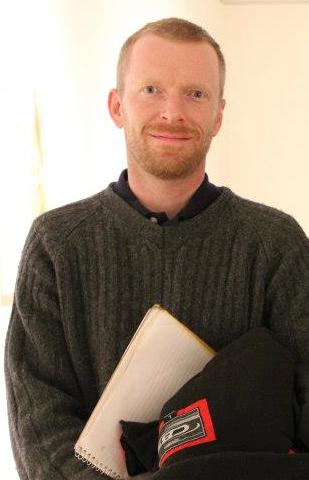Tyler Meuninck: a conduit to a free surface
“The final test of a painting, theirs, mine, any other, is: do the painter’s emotions come across?”
- Franz Kline
Yesterday, accompanied by the song of a lingering cicada, artist Tyler Meuninck and I sat down outside to talk about his upcoming show, a conduit to a free surface, which is opening this Friday in the Harrison Gallery. Meuninck, a former HCA artist, moved to Milwaukee in 2010 to pursue a MFA at the University of Wisconsin in Milwaukee after spending eight years painting within the walls that now house his most recent body of work.
Before meeting with Meuninck, I quietly slipped into the Harrison Gallery where I found myself alone with his work. Immediately I was lost in the artist's emotion. Meuninck’s work, which I later discovered is heavily influenced by postwar abstract expressionism, delegates the rich and textured neutrality of the Midwest’s industrial past. This body of work seemed almost to politely ask for my attention as I made my way around the room, and my gaze climbed the dense textures of each piece.
Our time together began with Meuninck's earliest memories. “I was very fortunate growing up in that both of my parents were artists. My father was a ceramics teacher, and my mother worked in textile design,” he explained, “Almost from birth I was attending shows with them, and I suppose the apple doesn’t fall far from the tree.”
Chronologically, we moved forward through his life in the visual arts. Meuninck said, “I attended IU in South Bend, Indiana, and I also attended Herron School of Art and Design in Indianapolis. I actually just earned my MFA this past year from the University of Wisconsin in Milwaukee.”
Interested in his personal process and personal purpose as a painter, I asked Meuninck about his craft. With the great care that is so obvious in his work, he took a moment to gather his thoughts and proceeded cautiously, “Painting is very positive when it starts,” he said, “but inspiration is fleeting and most of it becomes hard work. I think you start with an idea that seems very tangible, but comes out of an emotion. So you have this particular idea of what a painting could be, and the lasting impact it might have on whoever sees it, including yourself. It could be something very powerful.”
Meuninck went on to reference expressionist painter Frank Auerbach when he said, in reference to the great artist Rembrandt, “Great Rembrandts shake you.” Meuninck explained, “I think that it’s an incredibly difficult thing to do: to paint something with that kind of weight. It takes a fundamental knowledge to paint, but also an emotional integrity while painting to create a fixed image that powerful. That’s always been kind of the goal.”
True to his roots, Tyler Meuninck will present his show a conduit to a free surface tonight in the Harrison Gallery.




